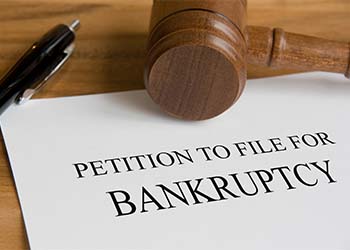What Happens When You File for Bankruptcy?
Sept. 21, 2023
 People often worry that they will never be able to get their debt under control without filing for bankruptcy. It is true that for many people, bankruptcy may be the only way out of their current financial struggle. However, before you file, you should understand what can and cannot be accomplished through bankruptcy and what the process of filing for bankruptcy entails.
People often worry that they will never be able to get their debt under control without filing for bankruptcy. It is true that for many people, bankruptcy may be the only way out of their current financial struggle. However, before you file, you should understand what can and cannot be accomplished through bankruptcy and what the process of filing for bankruptcy entails.
As a bankruptcy attorney with over 37 years of experience, I help people overwhelmed by debt understand the true nature of bankruptcy and explain what filing for bankruptcy would mean for them and their future. If you’re considering filing for bankruptcy, contact the Law Office of Victor Druziako, P.C., to receive a free consultation and discuss what to expect when you declare bankruptcy. My law office is based in Vineland, New Jersey, but I serve clients throughout South Jersey.
What Happens When You File for Bankruptcy?
Knowing what happens after you file for bankruptcy depends on the chapter you file for:
Chapter 7 bankruptcy. If you file for bankruptcy under Chapter 7, you can eliminate most of your unsecured debts by liquidating your non-exempt assets. Once your petition for bankruptcy is filed, your creditors will have to comply with the automatic stay, which orders debt collection actions to stop. In other words, it means that creditors will no longer be able to sue you, garnish your wages, or even contact you regarding your debt. Once your unsecured debts are discharged, you will no longer have to repay some or all of your financial obligations.
Chapter 13 bankruptcy. This type of bankruptcy allows you to refinance your debt so you can pay back your debts in full or in part over a three to five-year span. Once your petition for bankruptcy is approved, you will have to make monthly payments to a bankruptcy trustee assigned to your case who will then distribute the money to your creditors. Any unpaid debts at the end of your repayment plan may be discharged. Similar to Chapter 7 bankruptcy, an automatic stay is issued on the date you file your petition for Chapter 13 bankruptcy.
The only major downside of filing for bankruptcy is that your credit score will take a hit. However, by making smart decisions and adopting healthy financial habits after the bankruptcy, it is possible to rebuild your credit within the next couple of years.
The Bankruptcy Filing Process
If you have made up your mind about filing for bankruptcy, you probably want to understand what the process entails:
Finding an attorney. Filing for bankruptcy is a complicated process and requires more than just submitting a petition to the court. An attorney will help you protect the things you want to keep, explain how you can save money and minimize damage to your credit score, prepare and file the appropriate documents, and ensure that you meet all the correct deadlines.
Attending a credit counseling session. According to the U.S. Department of Justice, bankruptcy filers must attend credit counseling and obtain the certificate as proof of completion before they file for bankruptcy.
Filing for bankruptcy. Once you have your credit counseling certificate, you can file a petition for bankruptcy along with the certificate with the court. On the day you file your petition, the court will issue an automatic stay, which will prohibit your creditors from contacting you regarding the debt and pursuing any other collection efforts.
Assigning a bankruptcy trustee. Once your bankruptcy case is approved, the court will assign a trustee to your case whose main responsibility will be to administer your case and represent your creditors’ interests.
Liquidation/repayment. If you filed for Chapter 7 bankruptcy, the next step would be converting your non-exempt assets into cash for distribution among creditors. If you filed for bankruptcy under Chapter 13, the next step would be repaying a portion of your debt to your creditors as part of the repayment plan.
Completing a debtor education course. Before your debts are discharged, you are legally required to complete a mandatory debtor education course, which is intended to educate debtors about their finances and help them avoid bankruptcy in the future.
Getting a debt discharge. After a debtor education course is completed, you will be eligible to get your debts discharged and remove your obligation to pay creditors.
Life after bankruptcy. The discharge of your debt is not the end of your journey. Keep in mind that bankruptcy is likely to leave a stain on your credit report, which is why it is important to begin the process of rebuilding your credit as soon as possible. When your credit score takes a hit, it will be harder for you to take on new credit or get loans. There are many things you can do to get your credit score back on track, including paying creditors on time, building an emergency fund, sticking to a budget, and keeping a close eye on your credit score.
You might want to contact an attorney who would help you navigate the bankruptcy process and protect your rights at every step of the way to your new financial future.
Consult a Trusted Bankruptcy Attorney
The better you understand the bankruptcy process, the more confident you will feel when filing for bankruptcy. As an experienced attorney at the Law Office of Victor Druziako, P.C., I walk people through the bankruptcy process from beginning to end, helping them avoid any mistakes and overcoming any obstacles along the way. Reach out to my Vineland, NJ office and schedule a free consultation to discuss the bankruptcy process in detail.
